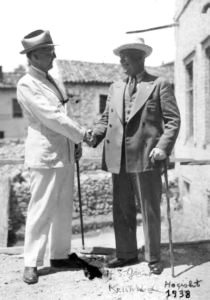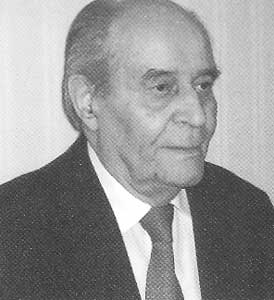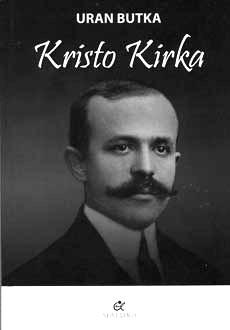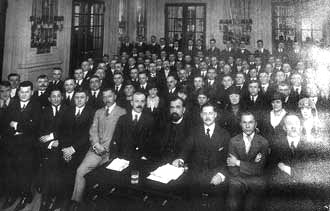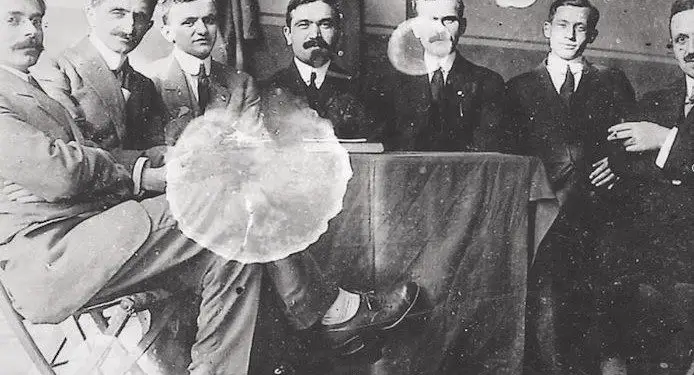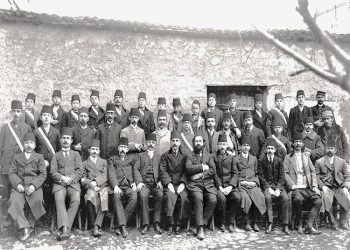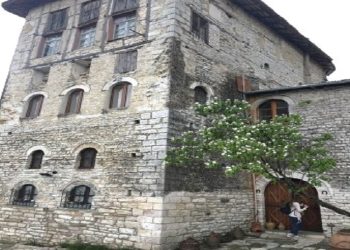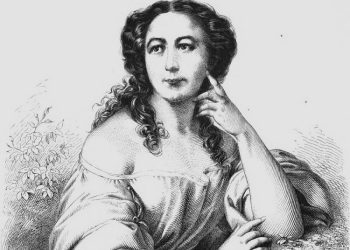From Alma Mile
Memorie.al / Another figure of national proportions, is taken out of the abyss of the deformed Albanian history. It is about Kristo Kirkë (1883-1955), Albanian patriot, one of the founders of the “Vatra” society in the USA, collaborator of Noli e Konica, deputy of the Albanian Parliament (1921-1924), consul in New York, deputy prefect of Bilishti, mayor of Korça, then vice-prefect of Korça, during the fascist and Nazi occupation, nationalist, who refused to cooperate with the communists and be put in charge of the Democratic Front. That was the reason why in 1946, he was arrested and sentenced to 20 years in political prison. He died after serving 10 sentences in Burrel Prison, when he was 72 years old. It is not known where his remains rest.
Meanwhile, the 19-year-old son was sentenced to 8 years in prison, while the wife and daughters were persecuted. In order to return a “debt” that Albanian history owes to Kristo Kirka and the entire Kirka family, historian Uran Butka wrote a monograph, which he simply calls “Kristo Kirka”, where through a rich documentation and memories of family members, he tells the life of the patriot.
For the historian Dr. Uran Butka, “Kristo Kirka is a figure of national proportions, but unfortunately forgotten, left aside. On the occasion of the 100th anniversary of independence, after a long work in the archives of Albania, the USA and especially ‘Vatra’, I have made an effort to bring to light this major figure of our nation”. According to Butka, like the case of Kristo Kirka, there are many other figures that need to be re-dimensioned and it is the duty of historians, researchers, and the media to make these figures known to the public.
Because Albania needs such figures, who represent it decently. Through Kristo Kirke, not only his activity is given, but also that of ‘Vatra’, the activity of the first Albanian Parliament, where he was a deputy in 1921-1924, of the Albanian delegations that went to the Peace Conference in Paris, where he was present and of course the efforts for the freedom and independence of the homeland”, says Butka. In this article, we have selected some passages from the monograph “Kristo Kirka”, where the shocking end of this patriot is shown.
From the book “Trial” by Dr. Uran Butka
Kristo Kirke was tried and sentenced by the Military Court of Tirana, on 17.12.1946, by a jury; chairman Gjon Banushi, major, former partisan and military prosecutor, Captain Petrit Hakani, known for the brutality and extreme political punishments of citizens throughout Albania.
Kristo Kirka was involved in a political trial, together with defendants whom she had never seen before: Fatbardh Kupin, son of Abaz Kupi, Dule Kuke, farmer, Nuredin Koxhej, farmer, Ded Gjon Marku, son of Gjon Markagjonit, Skënder Dine, son of Fiqri Dine, Nikolla Mole, commissioner, Loro Kubini, former officer, Nako Labi, merchant, Teki Mezini, former partisan, Abdulla Ceka, farmer and Rexhep Ceka, farmer.
Prosecutor Petri Hakani’s indictment for Kristo Kirka
The prosecuting body had drawn up an accusation in general terms for the 12 defendants, who did not connect any activity or contact with each other. While the special accusation against Kristo Kirka, as an “enemy of the people and a saboteur of power”, drawn up by the military prosecutor Petrit Hakani, was based on three “serious faults” of Kristo Kirka, which the Court took for granted:
“The defendant Kristaq Kirka, during the time of the fascist occupation, was a sub-prefect in Bilisht and reported the employees on the occasion of their departure from the fascist occupation, oppressed your people and accused them before the fascist authorities, on the occasion of the Italian-Greek war.
Given that the defendant was later appointed mayor of Korçë Municipality, he maintained an anti-popular and anti-national stance and in the interest of fascism, whose activity is proven by a series of letters that are in his relevant file…! After the capitulation of Italy and the occupation of Albania by Nazism, the defendant participates in the traitorous organization of the “National Front”, becoming a member of the district committee and later appointed deputy prefect of Korça.
The defendant, by means of demagoguery, misled people by introducing them into the ranks of this organization…! After the liberation of Albania, on the occasion of the elections of December 2, 1945, the defendant, being related to Col. Rodhet, etc. and all together in connection with the external reaction, have tried to sabotage the elections to overthrow the people’s power, with the external intervention”.
The Military Court sentenced Kristo Kirka, on 17.12.1946, to 20 years of political imprisonment. It did not matter to the Court whether the accusations were true or not, whether they were accepted or not by the defendants. It was important that they be punished as “enemies and, in the name of the people”, fill the prisons and forced labor concentration camps, as well as confiscate their assets. Of course, Kristo Kirka opposed and dismissed the baseless accusations against him and accepted with the sincerity that characterized him, real actions or social connections, even though they could harm him.
In the staged trial and conducted only in a short formal session, Kristo Kirka maintained a dignified attitude. In the last word, very sincerely, because he was telling the truth, but also humanely, because his life was painful, he said: “In my life, I have not done anything against the people. I ask the court for mercy and to decide with a clear conscience”.
Fan Noli intervenes next to Enver Hoxha, for Kristo Kirke
The Kirka and Harizi families were worried about Kristo’s fate. But also his friends and comrades-in-arms, inside and outside Albania. Petro Hariz’s son, Dhimitri, an immigrant to the USA, wrote to Fan S. Noli from Worcester to intercede with the Albanian government to save his close friend. Of course, they could not write to members of the Kirka family from Albania, because their letters were censored by the regime and did not go to their destination. Fan S. Noli was immediately interested in the Albanian government and returned this answer by telegram to Dhimitër Hariz:
Dear Tako:
According to your letter, I immediately wrote where it should, about the matter of Lord Kirka. I hope that my prayer will get them to work and ease their condition.
With the blessing of the heart, I remain your Desire with Christ
Bishop F.S. Noli
You are impressed by Noli’s use of the abbreviated name Tako, as Dhimitri was called in the family, which indicates his intimate relationship with the Kirka and Harizi families. But even Noli’s letter did not change anything in that unreasonable and insensitive system. Kristoja was returned from a man, to a number in the Tirana Prison, then to that of Burrel. A month after his arrest, they put the irons on his son.
The testimony of Katerina, the second daughter of Kristos, about the death of her father
It was the end of April 1955. Father had already been in prison for 10 years. Mother had been telling us for weeks that the government would surely issue a general pardon and release father. Even, he had seen it in his dream and his mind was full that the release of his father was a matter of days. On the morning of April 27, I got up early because it was my turn to go to Burrel.
“Don’t take the food back, since he will be released, but give it to the other prisoners,” my mother ordered. I left together with Gjergj Kokoshi’s mother. We arrived in Burrel with many difficulties and hardships, but we were used to it. And who shows them! We immediately went to the prison.
At the Iron Gate, we met Mrs. Iqbale Prodani and Mr. Xelal Koprencka, who had come to meet Sami Koprencka, father’s friend. Sami suffered in prison, while his son, Xelal, was later imprisoned and after being convicted five times, he was shot. They wanted to exterminate all generations of nationalists, as happened with our family…! We entered the outer courtyard.
At one inn, visitors would say the prisoner’s name and deliver food. When it was my turn, the guard told me that he could not keep the food because my father was very sick and the food was of no use to him. I insisted that he accept the food that the father would be fine, but the guard did not give me long. I begged him to let me see him, but he stopped listening to me and was busy with others. I left the food there and came back disappointed that it was gone.
By chance I saw the prison warden, dressed in military uniform and long polished boots. He beat his boots with a black whip and walked around the yard. I don’t remember his name, but his behavior and inhumane tortures against the prisoners had made him famous. However, I plucked up the courage and approached him. “Comrade Director, I am the daughter of Kristo Kirka, I told him. The guard tells me he is sick and I can’t see him.
Please, let me see him and say two last words to him, because maybe I won’t see him again”! He raised his head and looked at me with an indecipherable look, which is still etched in my brain today. An icy shiver ran through me. He won’t let me, I thought bitterly. He turned to the guards and said: “Leave it”! I wanted to thank him, but I had no energy, my mouth was dry and my mind was numb. I just stalked after the guards.
A door opened and I entered the second courtyard. The other door was opened, through which one entered the prison. There I saw Nesti Orollogan, my mother’s cousin, and Andon Frashër, my father’s friend, who approached me to tell me something, but the guards pushed them away. The father was laid on a wooden bed in the infirmary. A beautiful light had fallen on him. It looked like he was waiting for me. “Dad, I’m Rina”, I told him with a trembling voice, but he didn’t answer me. “Dad, dad”, I shook him, but he didn’t react.
I jumped on him, kissed him, and washed him with tears. He was alive, maybe listening to me, maybe asking for help. And I deserted him, I couldn’t give him anything! There was no one in the infirmary except for the silent guard. I went to the door, behind which several prisoners had gathered. I spotted Mihal Zallari. “Where is the doctor?” I asked. “Is there a doctor here”? He lowered his head and did not answer me.
Then I left the prison, with the idea of finding a doctor in the city.
At the city’s ambulance, I found Dr. Bakall. I asked him what his father had and what medicines were needed. He is in a coma; he told me and tried to convince me that he would get over it this time. I ran to the truck agency and there I found the mother of Gjergj Kokoshi, who was returning to Tirana, she was also very upset, because Gjergj had tuberculosis, in the last stage, but they kept him in a dungeon filled with water.
I gave him a letter for Niko, where I wrote “Father is very ill.” Let the mother go with the medicines”. That night I did not sleep. I had lost hope. I could not get rid of the thought that they put people in Burrel Prison to die. The next day, April 28, before dawn, I went to the prison to ask, but no one opened the door for me.
When the meeting time came, the guard gave me the terrible news that Dad had passed away. I gathered myself and asked for my body to surrender. An officer told me that the body could be taken when the term of the sentence was up, that is, after another 11 years! I turned my back and ran away from my feet. With Mrs. Prodani and Xelal Koprencka, we got on a truck to go back. On the road, near Milot, where we had stopped, I saw my mother on another truck, going to Burrel. I called to them with all my strength and the truck stopped.
I went there in a hurry. She immediately understood what had happened. We were at each other’s throats and were written in oil. “You didn’t make the children happy”, she told him through sobs. After 40 days, we returned to Burrel again, to see the place where he was buried and to put a bunch of flowers. But the guards led us around and finally showed us a place with bushes near Kershiza, where there were only bones…! Even today we don’t know where the bones are…”!
Niko’s arrest and imprisonment
Kristo Kirka’s son, Niko, was arrested together with Nikollë Dakaj, Trajan Xheka, Peti Zisi and Pjetër Ceka, on 29 June 1946. According to the military prosecutor, Misto Bllaci, they were accused of: “They held various illegal gatherings, against the government, with the aim of terror, increasing their line on a large scale.
They tried to organize terrorist groups in the ranks of the National Army, in order to overthrow the government with violence and carry out assassinations against the leaders. They have sabotaged the voluntary works of reconstruction, as well as the various elections of the Front, in a word; they have been sworn enemies of the democratic government….”!
After the investigation, the 19-year-old defendant, Niko Kirka, was brought before the Military Court on 28.09.1946, accusing him of “serious crimes” against the state. The president of the military court was Llazi Polena, and the prosecutor, Misto Bllaci…! In the corresponding archival document, among other things, it is said: “A part of the diary was read to him and he said: I am against the government, you can’t live with these stinks, I have hope in the change of the regime, which I expected from foreign policy.”
One of the accusations in the investigator and in the trial for Niko Kirka, was that he “stemmed from a reactionary family and that he followed in the footsteps of his father, Kristo Kirka, sentenced to prison as an enemy of the people”. In Niko’s answers, although his sentence could be increased, he expresses respect for his father and the desire to return his time. The court, for its part, added other charges, calling Niko “part of an organization that tried to propagate against popular power, to overthrow it”:
“Niko Kirka, in order to increase the ranks of the organization, in any case, spread slogans against popular power, so much so that one day, in the garden of Themistocles, they had opened the conversation about nationalization with their friends, the defendant Niko Kirka, did not fail to criticize the reforms of the government, but on the other hand, with the aim of humiliation, he spoke among the crowd of students: ‘Now there is nothing left but to nationalize women too'”! (Archive of the Ministry of the interior, part from the trial of Niko Kirka, 28.09.1946).
The Military Court sentenced Niko Kirka to 8 years in prison and the loss of electoral rights. Regarding this, Nikoja confesses: “It was the third day that I was arrested. They had put me in one of the dungeons they had built in the basements of the building, once the Italian Consulate in Korça. I was young, almost 19 years old, physically strong, so I could handle that condition and I didn’t feel faint staying in that hut, in complete darkness. But I was tormented by the thought of how difficult it must have been for my father, at an advanced age and in poor health, there in the dungeons of Tirana.
Grinding these thoughts, I heard the cellar door open and a soldier told me to follow him. We went upstairs. In a room like an office, with a table at the top, some of the officers of the Section of the Defense Division, which was later called the State Security, were lined up. There were Naum Bezhani, Petro Pobicka, who later took the name Petro Dode, Vaskë Nasto, Peço Nedelli and Enriko Bimbli, who had previously arrested the father. They told me to sit on a chair in front of them and they started mentioning to me some phrases from my diary, which Enriko Bimbli had seized when he came after midnight to arrest my father.
During those question-answers, Petro Pobicka suddenly got up, approached me and hit me in the face with the back of his hand. It was a blow from what is called a ‘dry hand’ and the ring he had on his finger tore my lip on the left side. Blood began to flow. How it burned me, how much it hurt me! Later, during the imprisonment, they beat me until they were tired, they knocked me down, but I feel the burning of that beating even today! It was the first time I was shot. But I kept myself, my father had taught me to stay in any situation. “When you’re in trouble, grit your teeth and find a way out.” Memorie.al




